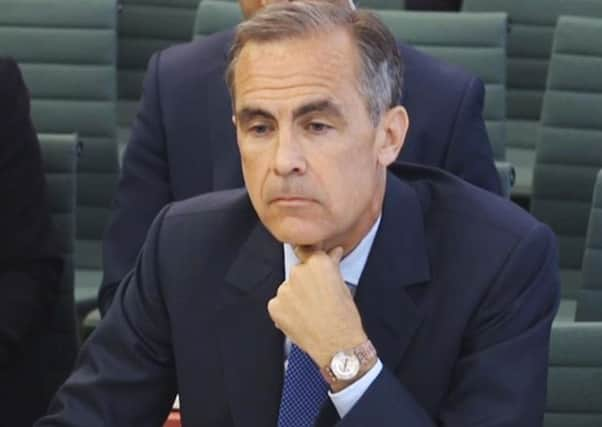Mark Carney denies '˜peddling' Brexit scare stories


In his first hearing with MPs since the Brexit vote, Carney was grilled on accusations of “startling dishonesty” and of “peddling phoney forecasts and scare stories” made last month by two former chancellors and two former Conservative party leaders.
Carney insisted he had no meetings with Chancellor George Osborne to discuss the Bank’s line on the Brexit risks before last month’s referendum and said the accusations were “extraordinary”.
Advertisement
Hide AdAdvertisement
Hide AdHe told MPs the discussions and assessments made by the Bank’s financial policy committee (FPC) were “not pre-judged or pre-decided”.
Carney had warned that a decision to leave the EU could tip the UK into a recession and lead to sharp falls in the value of the pound ahead of the vote.
The comments were slammed at the time by supporters of the Leave campaign and led to calls for Carney to resign as the Bank’s independence came into question.
In a letter before the vote last month, former Tory leaders and chancellors Iain Duncan Smith, Nigel Lawson, Norman Lamont and Michael Howard wrote: “There has been startling dishonesty in the economic debate, with a woeful failure on the part of the Bank of England, the Treasury, and other official sources to present a fair and balanced analysis.
“They have been peddling phoney forecasts and scare stories to back up the attempts of David Cameron and George Osborne to frighten the electorate into voting Remain.”
Andrew Tyrie, chairman of the Treasury Select Committee, said they were “very serious allegations”.
But Carney and fellow members of the FPC told MPs that the Bank’s warnings were made after “robust discussions” within the committee.
“I did not prejudge the lines of the policy committee and nor could I,” Mr Carney insisted.
Advertisement
Hide AdAdvertisement
Hide AdHe added he did have discussions with Osborne about the risks surrounding Brexit, but not on the lines the Bank would take.
MPs asked Carney to make public the minutes of his meetings with Osborne, although Carney said he believed bank governors and the Chancellor should be able to have “free-flowing discussions” away from the public glare.
Carney and fellow officials told MPs that many of their warnings about the economic risks of Brexit were beginning to emerge.
Figures last week showed British consumer confidence suffered its steepest fall in more than two decades after the Brexit vote, the pound has hit 31-year lows against the US dollar and commercial property funds have had to go into lock-down after a rush by investors to pull out cash.
On financial stability issues, MP Rachel Reeves questioned if the Bank’s recent move to give banks another £150 billion of lending firepower would be enough.
Carney said there would not be a repeat of the credit crunch seen in the financial crisis, but cautioned demand for credit was likely to fall amid the uncertainty caused by the Brexit vote.
He added: “We would not represent this as a single silver bullet. It is part of a series of measures.”
The Bank is expected to slash interest rates – possibly as soon as this Thursday – and pump more money into the economy through its quantitative easing programme to shore up flagging growth following the Brexit decision.
Advertisement
Hide AdAdvertisement
Hide AdIt has already pledged at least £250bn if needed to calm markets in the immediate aftermath of the Brexit decision.
On the threat posed by Italian banks, which are under pressure amid increasing bad debts, Carney moved to assure over a “modest” UK exposure to the sector and wider Italian economy.
He said UK banks had a 0.9 per cent exposure to Italian banks and an 11 per cent exposure to the Italian economy.
Carney was also questioned on the move by property funds to suspend dealing in recent weeks.
Minutes of the FPC’s latest meeting show it was briefed in advance about the likelihood of property fund suspensions.
Carney said markets had created funds with daily liquidity that invest in illiquid assets, such as property and emerging market corporate debt, but stressed the Financial Conduct Authority was aware and looking at the issue.
